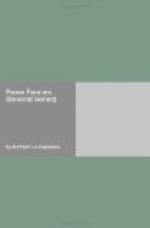Who, indeed, are our enemies? Broadly speaking, they are all those people who lack what we possess.
If you are rich, every poor man is necessarily your enemy. If you are beautiful, the great democracy of the plain and ugly will mock you in the streets. It will be the same with everything you possess. The brainless will never forgive you for possessing brains, the weak will hate you for your strength, and the evil for your good heart. If you can write, all the bad writers are at once your foes. If you can paint, the bad painters will talk you down. But more than any talent or charm you may possess, the pearl of price for which you will be most bitterly hated will be your success. You can be the most wonderful person that ever existed, so long as you don’t succeed, and nobody will mind. ’It is the sunshine,’ says some one, ‘that brings out the adder.’ So powerful, indeed, is success that it has been known to turn a friend into a foe. Those, then, who wish to engage a few trusty enemies out of place need only advertise among the unsuccessful.
P.S.—For one service we should be particularly thankful to our enemies—they save us so much in stimulants. Their unbelief so helps our belief, their negatives make us so positive.
THE DRAMATIC ART OF LIFE
It is a curious truth that, whereas in every other art deliberate choice of method and careful calculation of effect are expected from the artist, in the greatest and most difficult art of all, the art of life, this is not so. In literature, painting, or sculpture you first evolve your conception, and then, after long study of it, as it glows and shimmers in your imagination, you set about the reverent selection of that form which shall be its most truthful incarnation, in words, in paint, in marble. Now life, as has been said many times, is an art too. Sententious morality from time past has told us that we are each given a part to play, evidently implying, with involuntary cynicism, that the art of life is—the art of acting.
As with the actor, we are each given a certain dramatic conception for the expression of which we have precisely the same artistic materials—namely, our own bodies, sometimes including heart and brains. One has often heard the complaint of a certain actor that he acts himself. On the metaphorical stage of life the complaint and the implied demand are just the reverse. How much more interesting life would be if only more people had the courage and skill to act themselves, instead of abjectly understudying some one else! Of course, there are supers on the stage of life as on the real stage. It is proper that these should dress and speak and think alike. These one courteously excepts from the generalisation that the composer of the play, as Marcus Aurelius calls him, has given each of us a certain part to play—that part simply oneself: a part, need one say, by no means as easy as it seems;




